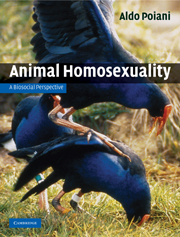Book contents
- Frontmatter
- Dedication
- Contents
- Contributors
- Acknowledgements
- Preface
- 1 Animal homosexuality in evolutionary perspective
- 2 The comparative study of homosexual behaviour
- 3 Genetics of homosexuality
- 4 Ontogenetic processes
- 5 The endocrine and nervous systems: a network of causality for homosexual behaviour
- 6 Immunology and homosexuality
- 7 Sexual segregation effects
- 8 The social, life history and ecological theatres of animal homosexual behaviour
- 9 Homosexual behaviour in primates
- 10 A Biosocial Model for the evolution and maintenance of homosexual behaviour in birds and mammals
- Appendix 1 Glossary
- Appendix 2 Predictions of the Synthetic Reproductive Skew Model of Homosexuality and results obtained in the comparative tests of the model carried out in birds and mammals
- Appendix 3 Comments on further results of comparative analyses of independent contrasts reported in the full correlation matrices of birds and mammals
- References
- Index
- Plates
6 - Immunology and homosexuality
Published online by Cambridge University Press: 05 July 2014
- Frontmatter
- Dedication
- Contents
- Contributors
- Acknowledgements
- Preface
- 1 Animal homosexuality in evolutionary perspective
- 2 The comparative study of homosexual behaviour
- 3 Genetics of homosexuality
- 4 Ontogenetic processes
- 5 The endocrine and nervous systems: a network of causality for homosexual behaviour
- 6 Immunology and homosexuality
- 7 Sexual segregation effects
- 8 The social, life history and ecological theatres of animal homosexual behaviour
- 9 Homosexual behaviour in primates
- 10 A Biosocial Model for the evolution and maintenance of homosexual behaviour in birds and mammals
- Appendix 1 Glossary
- Appendix 2 Predictions of the Synthetic Reproductive Skew Model of Homosexuality and results obtained in the comparative tests of the model carried out in birds and mammals
- Appendix 3 Comments on further results of comparative analyses of independent contrasts reported in the full correlation matrices of birds and mammals
- References
- Index
- Plates
Summary
In placental mammals, offspring develop in the maternal womb for the initial stages of their life. This implies a risk that the foetus will be recognised as a foreign body by the maternal immune system. For instance, foetal expression of molecules encoded in the genes of paternal origin, which may be different from maternal molecules, may trigger an immune response from the mother. Some specific targets of maternal immunity include products of paternal major histocompatibility (MHC) genes that can be expressed by the outer layer of cells (the trophoblast) surrounding the blastocyst. In fact, foetal MHC molecules are major antigens (Bainbridge 2000). Other important antigens of foetal origin that are paternally inherited, such as human leukocyte antigens (HLA), are responsible for the production of specific immunoglobulin G (IgG) antibodies in about 30% of mothers in humans (Luppi 2003; see also Goulmy et al. 1977; Gangestad et al. 1996).
A maternal immune reaction against her own offspring may lead, in the most extreme cases, to abortion (Thellin & Heinen 2003). Some major maternal immune mechanisms leading to rejection of the foetus include T helper cells 1 and 2 imbalance (Th1/Th2) favouring Th1 cells, which produce specific cytokines, e.g. tumour necrosis factor alpha (TNFα), interleukin 2 (IL2) and gamma interferon (IFNγ), among others. Such Th1 cytokines can then activate natural killer (NK) cells and inflammatory macrophages, which, in turn, can kill other cells, those of the embryo in this case. Cells of the trophoblast can also increase their production of the pro-thrombinase fgl2 as a result of Th1 cytokine action, with fgl2 having the ability to produce a thrombosis in the placenta, thus shutting down blood flow, which may ultimately lead to loss of the foetus (see Thellin & Heinen 2003 for additional mechanisms also leading to foetal rejection). If, on the other hand, the Th1/Th2 imbalance favours Th2, then the pregnancy is carried on normally (Szekeres-Bartho 2002). Whenever the foetus is capable of surviving a maternal immune attack, chances are that the newborn may display a phenotype that reflects the results of that attack during its early development.
- Type
- Chapter
- Information
- Animal HomosexualityA Biosocial Perspective, pp. 265 - 282Publisher: Cambridge University PressPrint publication year: 2010



